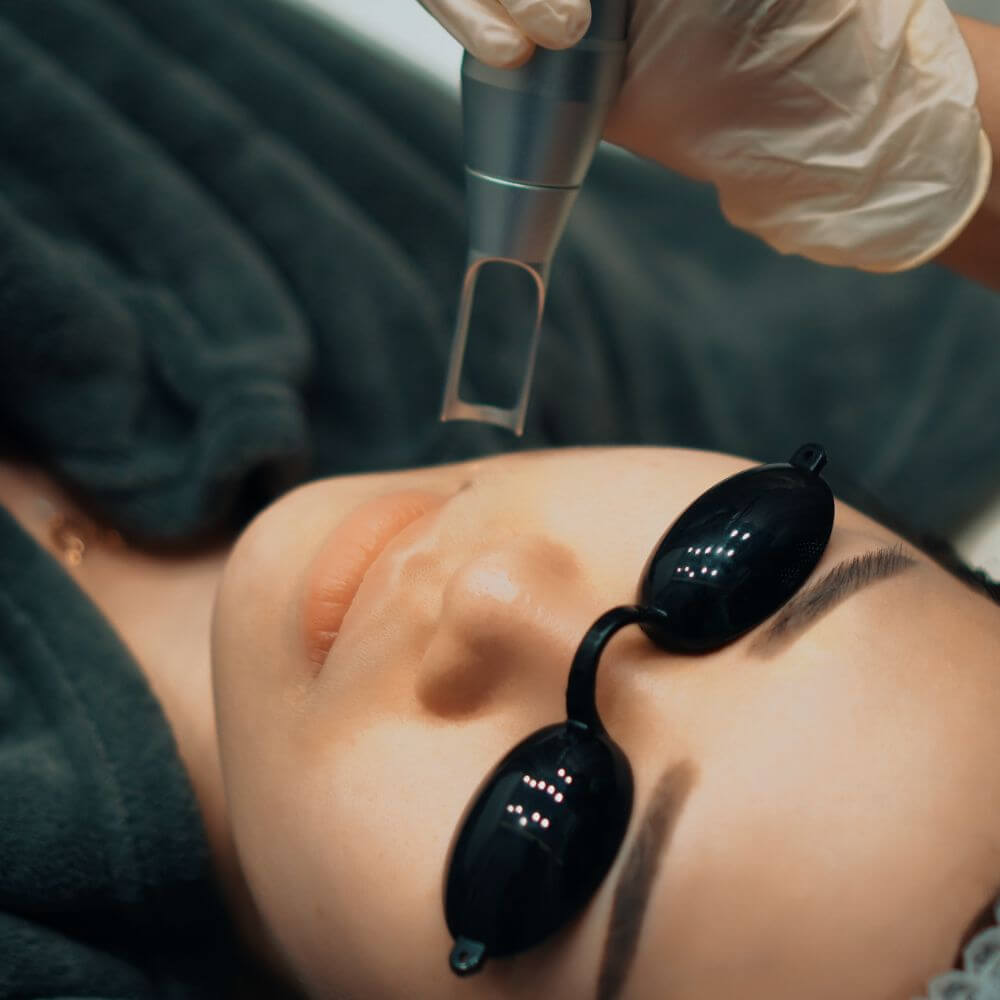Laser hair removal, which uses lasers and selective photothermolysis, has become an increasingly popular method recommended by dermatologists and aesthetic clinics in Singapore for achieving smooth, hair-free skin.
While many individuals have embraced laser hair removal, there are some who have understandable concerns over its safety and possible side effects.
This article aims to delve into the topic and uncover whether laser hair removal is bad for the skin or a safe and effective solution for long-term hair reduction.
What Is Laser Hair Removal?
Laser hair removal is a cosmetic process that uses lasers and concentrated light energy to target melanin in hair follicles on sensitive skin, to stop new hair from growing.
The procedure can be used to address unwanted hair growth in various areas of the body, including the legs, arms, and even sensitive areas like the face, bikini line, and more. It offers a potentially longer-lasting solution compared to traditional hair removal methods such as shaving, waxing, or threading.
Understanding How Laser Hair Removal Interacts with Your Skin

Laser hair removal works on the principle of selective photothermolysis. It is a common misconception that the radiation from these lasers is harmful, like X-rays or UV radiation. In reality, the laser light used is a non-ionising radiation that is specifically designed to be safe for cosmetic procedures.
By using a particular wavelength of light for a short duration, the laser’s energy is only absorbed by the melanin (pigment) present in the hair follicles, generating heat that damages the follicles and prevents regrowth. The surrounding skin remains largely unaffected because the laser’s wavelength is designed to target the melanin in the hair, sparing the surrounding tissue.
This also explains why different wavelengths are used for different skin tones and hair colours; a longer wavelength, like that of the Nd: YAG laser, is safer for darker skin as it bypasses the surface pigment to target the melanin in the deeper follicle, potentially enhancing both efficacy and safety.
The effectiveness of the treatment can vary based on factors such as hair colour, skin type, and the specific area being treated. However, the technology behind laser hair removal has advanced significantly over the years.
Early lasers were more likely to cause side effects, particularly for individuals with darker skin tones. Today, modern devices are designed to be more precise and customisable, potentially reducing the risk of complications.
Is Laser Hair Removal Safe for Different Skin Types Common in Singapore?
Is laser hair removal bad for your skin? The short answer is no.
When performed by trained professionals and using FDA-approved devices, laser hair removal does not damage the skin. It is also generally considered safe for the diverse range of skin types and skin tones common in Singapore, such as Fitzpatrick scale types III, IV, and V.
However, specific laser technologies may be needed for darker skin tones. The Nd: YAG laser, for instance, can be effective and safe for darker skin types because its longer wavelength bypasses the skin’s surface pigment, targeting the hair follicle directly. This could manage the risk of hyperpigmentation and ensure the laser hair treatment is both effective and secure for a wide range of patients.
Minimising Risks and Maximising Results
To minimise the risks associated with laser hair removal and potentially ensure the best possible outcomes, consider taking the following steps:
- Choose A Reputable Provider: Research and select a reputable clinic that includes experienced and certified professionals.
- Skin Evaluation: Prior to treatment, undergo a thorough evaluation of your skin type and medical history to determine the most suitable laser and settings for your skin.
- Test Patch: If possible, request a test patch to assess how your skin reacts to the laser before undergoing a full treatment session.
- Follow Pre and Post-Treatment Instructions: Adhere to any pre-treatment guidelines provided by your practitioner, and follow their post-treatment care instructions carefully.
Potential Temporary Side Effects of Laser Hair Removal
Some individuals may experience a few temporary side effects from laser hair removal, such as:
- Redness (erythema)
- Mild swelling (follicular oedema)
- Slight itching or tingling in the treated area
These are normal reactions to the heat from the laser and indicate that the treatment is effectively targeting the hair follicles. These effects typically subside quickly, usually within a few hours to a day after the procedure.
Addressing Common Concerns and Misconceptions About Laser Hair Removal Safety
Many people have questions about the safety of laser hair removal, and it’s important to separate fact from fiction.
One common misconception is that laser hair removal causes cancer. This is false; the laser light used is a non-ionising radiation that only penetrates the skin to the hair follicle and does not reach or damage internal organs.
Another concern is that it can cause infertility. This is also a myth, as the lasers do not penetrate deep enough to affect reproductive organs.
Laser hair removal has a long history of safe use in dermatology and is a trusted method for hair reduction when performed correctly by trained professionals.
When Laser Hair Removal Might Not Be Suitable (Contraindications)
While laser hair removal is widely safe and effective, there are specific conditions or situations where it might be contraindicated or require extra caution. These include:
- Pregnancy: Although hair removal lasers do not reach the organs, it is usually best to avoid treatment.
- Certain Skin Conditions: Individuals with active infections, cold sores, or a history of keloid scarring in the treatment area may not be suitable candidates.
- Medications: Some medications, particularly those that increase photosensitivity (like certain antibiotics or acne treatments), can make the skin more reactive to the laser.
It is crucial to have an open and honest conversation about your full medical history with your practitioner during the initial consultation.
Your Hair Removal Journey
Laser hair removal, when performed by certified professionals and using appropriate equipment, is generally safe and effective for long-term hair reduction.
While some individuals may experience mild side effects, these are typically temporary and subside on their own. To ensure a positive experience, it is crucial to choose a reputable provider and communicate openly with your practitioner about any concerns or skin sensitivities.
Always remember that individual responses to laser hair removal can vary. If you are considering laser hair removal, consult with a qualified professional to discuss your options and embark on a journey towards smoother, hair-free skin with confidence.
Schedule a consultation today and start your journey.
This blog post was medically reviewed by Dr. Ian Tan.










